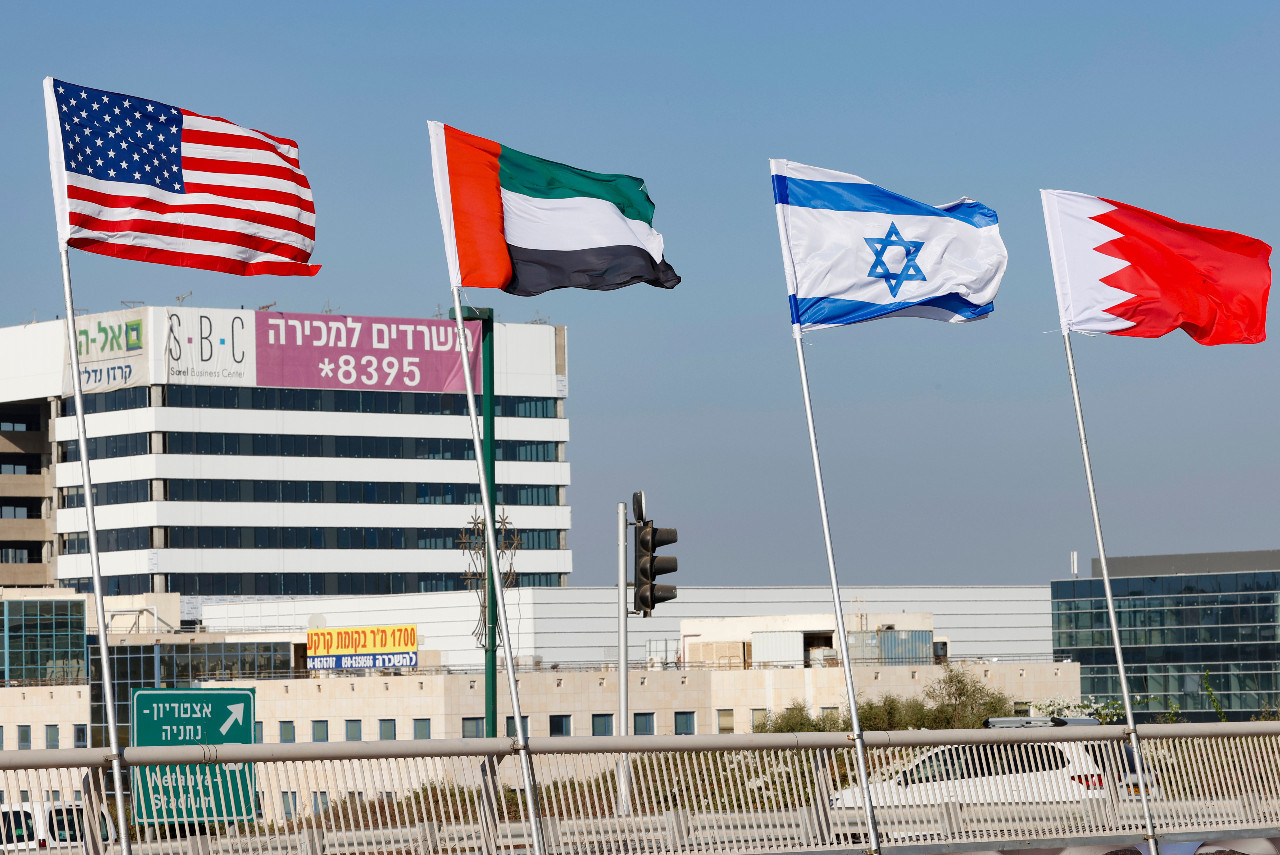Popular Reads
Top Results
Can't find what you're looking for?
View all search resultsPopular Reads
Top Results
Can't find what you're looking for?
View all search resultsShould Indonesia open diplomatic relations with Israel?
Future engagement with the Israelis should not be ruled out altogether if we are to play a more active role in achieving a two-state solution.
Change text size
Gift Premium Articles
to Anyone
I
n a flurry of diplomatic maneuvering prior to stepping down from office, United States President Donald Trump has been able to secure the diplomatic normalization of several Arab countries with Israel.
One could surmise that it was only a matter of time before such a diplomatic offensive would arrive at our shores. True enough, during the past weeks, there have been a number of messages coming out of Washington to this effect. The most recent was a statement made by Adam Boehler, the CEO of US International Development Finance Corporation, a US government agency in charge of international investments, who said on Dec. 21 that the US was willing to double its current portfolio of US$1 billion in Indonesia, if Indonesia developed ties with Israel.
Should Indonesia, the largest Muslim nation in the world, agree, it would be a major diplomatic victory for the departing Trump administration. But should Indonesia open diplomatic relations with Israel?
It is easy to utter an impromptu negative reaction to this question. Israel, after all, is one of the world’s remaining bogeymen, a country that still carries out active occupation activities amid vastly shifting international norms that stress independence and non-interference.
Different from the realities in the Middle East, Israel is distant from Indonesia. The only references to Israel that most Indonesians have probably stem from religious texts, rather than the modern realities of the Jewish state. Not a lot of Indonesians probably know that Israel does have a 20 percent Arab population, of whom around 90 percent are Muslims; and that at 18 percent, Islam is the second-largest religion in Israel after Judaism.
Arab Israelis also have healthy representation in the Knesset, Israeli’s parliament. The Joint List (a coalition of Arab parties) occupies the third-largest faction there, after the conservative Likud and the coalition of liberal parties.
This lack of intimate knowledge among Indonesians would make any overture toward opening ties with Israel a highly unpopular decision that probably no Indonesian president would dare to make in the foreseeable future.
However, the above question actually begs deeper thinking and analysis. This is important because we need to have a clearer pragmatic policy blue print on the resolution of the Israeli-Palestinian question. Future engagement with the Israelis should not be ruled out altogether if we are to play a more active role in achieving a two-state solution, as the position of the international community and as the Palestinians prefer.
There are several things to consider. First, it is important to note that the recent diplomatic US overtures were done by a lame-duck administration. It is difficult to ascertain the Trump administration’s motivation behind such moves; whether they were done in the sincere wish to protect Israelis’ interests or were driven by the desire to leave time-bombs for the incoming Joe Biden administration.
In any case, it would be very difficult to undo many of Trump’s actions, such as the relocation of the American embassy to Jerusalem and the diplomatic normalization of the Arab countries. On one hand, Biden will probably appreciate the Arab-Israeli thawing and will even continue along this line of policy. But on the other hand, Trump has given much leeway for Netanyahu’s policy of expansion of Jewish settlements in much of the occupied internationally recognized Palestinian territory that it would pose a challenge for Biden to undo, even if he wants to do so.
But one thing seems certain, Biden’s foreign policy will bring the US to the fold of the multilateralism, and despite the inroads made by Israel in the past few months in terms of international recognition, Israel is still highly unpopular in international fora. Hence, it is wise for Indonesia not to jump in the bandwagon of Arab countries opening ties with Israel.
Second, Arab countries’ recognition of Israel seems to be driven mostly by geopolitical or self-motivation. This is most obvious in the United Arab Emirates’ and Bahrain’s decision. The two Gulf countries are facing what they deem as threats from Iran’s more aggressive behavior (and to a lesser extent, Qatar, which is widely seen as an Iranian proxy in the region). The two Gulf countries’ decision seems to be based on the desire to receive more weaponry from the US and Israel to counter Iran.
Sudan’s decision is clearly based on its wish to be taken out of the US-imposed pariah status, while Morocco has had a long history of affinity with its sizeable Jewish population (around 1 million of Israel’s population have Moroccan lineage). Indonesia does not have all of the above motivations to open ties with Israel.
Third, Indonesia does not have significant economic relations with Israel, although it is a public secret that trading between the countries has mostly been done through third-party facilitation, mostly Singapore.
Indonesia would probably benefit more from direct trade, which can be done if a diplomatic relationship is established. However, Israel is not a major country in terms of the economy. Its population of 9.2 million is relatively small and its economic size ranks 33rd in the world.
Indonesia does have some tacit cooperation on defense with Israel during the 1970s, including the purchase of A-4 Skyhawk for the Indonesian Air Force from the Israel Defense Force. While Indonesia could probably benefit from the relatively high technological defense industries of Israel, since the engagement in the 1970s, Indonesia has shopped its defense needs from various other sources.
Fourth, political reason might be the only factor that could lead to the opening up of relations with Israel. But Indonesia should put this squarely within our constitutional mandate of foreign relations, which is to seek “world order based on independence, eternal peace and social justice”. Nowhere are these principles more lacking than in the case of Palestine.
Indonesia has the potential to assist the Palestinians in achieving their statehood more actively through establishing some forms of engagement with Israel. Many decades of Israel’s international isolation have only created a more belligerent and repressive Israel state and life has, thus, become more difficult for the Palestinians by the day.
Indonesia does not have any geopolitical design in the region, so an honest brokerage is possible. We can do this, among other strategies, by carrying out the long-conceived plan of opening a resident mission in Ramallah, the capital of the Palestinian state. This mission (now covered by the Indonesian Embassy in Amman) can more actively help the Palestinians through various forms of development cooperation. At the same time, this mission can serve as a conduit for more direct communication with the Israelis, in the effort of exploring ways in which Indonesia can play some role in brokering peace in the territory.
In the final analysis, opening up of diplomatic relations with Israel should come as a natural consequence from improvement in the situation for the Palestinians.
***
The writer is a lecturer, Graduate Program, Padjadjaran University.










